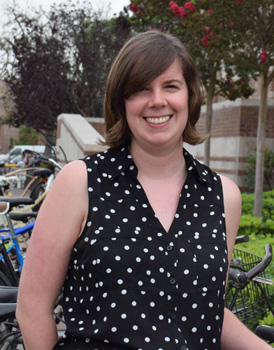
Robin Migdol
With an ambitious slate of visiting scholars, academic events, educational programs and trips to faraway places, the staff of USC Shoah Foundation tends to be a busy lot.
In order to share these interesting goings-on with people around the world, the Institute updates its website daily with news stories and profiles of some of the people who pass through its doors.
The job to chronicle these events for the outside world falls to one person.
In the year since she started working at USC Shoah Foundation, Robin Migdol has written more than 400 stories about the Institute, making her one of the busiest people in the place. That’s five stories a week, plus about three profiles. In addition, Migdol helps write and edit PastForward, the annual digest produced by the Institute and does other writing duties as needed.
Writing has always been on Migdol’s mind, but it wasn’t until she reached college and writing stories for the paper at UC Davis, where she majored in English and film studies, that she realized she could make a living at it.
After graduation, she headed south, where she enrolled in a master’s program in specialized journalism at USC Annenberg School for Communication and Journalism. She focused on writing about the arts.
When she finished that program in 2013, she started looking for work.
“I wanted a job in arts reporting, but there aren’t many of those,” she said.
Instead, she chanced upon an opening at USC Shoah Foundation, but the job was for a social media coordinator. She applied, but the person who interviewed her asked if she was interested in a writing job. She said yes.
“I wasn’t too familiar with the Institute, but immediately became interested,” Migdol said. “Seeing how passionate everybody is and watching testimony, it sparked an interest I didn’t know I had. I like to challenge myself.”
It’s an unexpected career path that she’s excited about.
“I’m in a job that’s meaningful and means something,” she said.” And I’m proud every time I see someone interact with a story on social media.”
One difficulty of the job is getting people to open up to her about the work they do.
“It can be difficult to draw people out,” she said. “People are modest and don’t always think of what they do as being newsworthy. Actually, they are doing amazing work and people should read about it.”
Now 24 and living not far from campus with her twin sister, Migdol knows she’s found the right place to work.
“Everyone is nice and cares about what they do,” she said. “People are sensitive and conscientious. They have a huge job of preventing genocide. It doesn’t get much more important than that.”